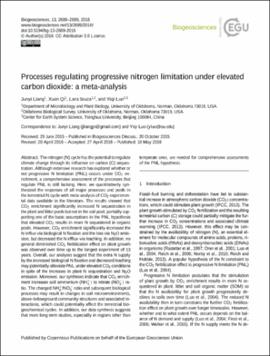| dc.contributor.author | Liang, Junyi | |
| dc.contributor.author | Qi, Xuan | |
| dc.contributor.author | Souza, Lara | |
| dc.contributor.author | Luo, Yiqi | |
| dc.date.accessioned | 2021-05-26T19:44:47Z | |
| dc.date.available | 2021-05-26T19:44:47Z | |
| dc.date.issued | 2016-05-10 | |
| dc.identifier.citation | Liang, J., Qi, X., Souza, L., and Luo, Y.: Processes regulating progressive nitrogen limitation under elevated carbon dioxide: a meta-analysis, Biogeosciences, 13, 2689–2699, https://doi.org/10.5194/bg-13-2689-2016, 2016. | en_US |
| dc.identifier.uri | https://hdl.handle.net/11244/330041 | |
| dc.description.abstract | The nitrogen (N) cycle has the potential to regulate climate change through its influence on carbon (C) sequestration. Although extensive research has explored whether or not progressive N limitation (PNL) occurs under CO2 enrichment, a comprehensive assessment of the processes that regulate PNL is still lacking. Here, we quantitatively synthesized the responses of all major processes and pools in the terrestrial N cycle with meta-analysis of CO2 experimental data available in the literature. The results showed that CO2 enrichment significantly increased N sequestration in the plant and litter pools but not in the soil pool, partially supporting one of the basic assumptions in the PNL hypothesis that elevated CO2 results in more N sequestered in organic pools. However, CO2 enrichment significantly increased the N influx via biological N fixation and the loss via N2O emission, but decreased the N efflux via leaching. In addition, no general diminished CO2 fertilization effect on plant growth was observed over time up to the longest experiment of 13 years. Overall, our analyses suggest that the extra N supply by the increased biological N fixation and decreased leaching may potentially alleviate PNL under elevated CO2 conditions in spite of the increases in plant N sequestration and N2O emission. Moreover, our syntheses indicate that CO2 enrichment increases soil ammonium (NH4+) to nitrate (NO3−) ratio. The changed NH4+/NO3− ratio and subsequent biological processes may result in changes in soil microenvironments, above-belowground community structures and associated interactions, which could potentially affect the terrestrial biogeochemical cycles. In addition, our data synthesis suggests that more long-term studies, especially in regions other than temperate ones, are needed for comprehensive assessments of the PNL hypothesis. | en_US |
| dc.description.sponsorship | This study was financially supported by the US Department of Energy, Terrestrial Ecosystem Sciences grant DE SC0008270 and Biological Systems Research on the Role of Microbial Communities in Carbon Cycling Program grants DE-SC0004601 and DE-SC0010715. | en_US |
| dc.language | en_US | en_US |
| dc.rights | Attribution 4.0 International | * |
| dc.rights.uri | https://creativecommons.org/licenses/by/4.0/ | * |
| dc.subject | Nitrogen limitation | en_US |
| dc.subject | Nitrogen cycle | en_US |
| dc.subject | Climate change | en_US |
| dc.subject | Carbon sequestration | en_US |
| dc.subject | Carbon dioxide | en_US |
| dc.title | Processes regulating progressive nitrogen limitation under elevated carbon dioxide: a meta-analysis | en_US |
| dc.type | Article | en_US |
| dc.description.peerreview | Yes | en_US |
| dc.identifier.doi | 10.5194/bg-13-2689-2016 | en_US |
| ou.group | College of Arts and Sciences::Department of Microbiology and Plant Biology | en_US |

